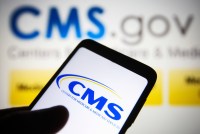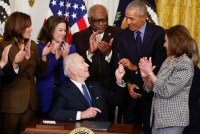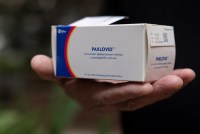Latest KFF Health News Stories
Did Your Health Plan Rip Off Medicare?
KHN has released never-before-seen details of federal audits as the government weighs action against dozens of Medicare Advantage plans.
Journalists Follow Up on Radon Mine Health Spas, Open Enrollment, and Health Fraud
KHN and California Healthline staff made the rounds on national and local media this week to discuss their stories. Here’s a collection of their appearances.
The debt ceiling crisis facing Washington puts Medicare and other popular entitlement programs squarely on the negotiating table this year as newly empowered Republicans demand spending cuts. Meanwhile, as more Americans than ever have health insurance, the nation’s health care workforce is straining under the load. Joanne Kenen of the Johns Hopkins Bloomberg School of Public Health and Politico, Tami Luhby of CNN, and Victoria Knight of Axios join KHN’s chief Washington correspondent Julie Rovner to discuss these topics and more. Plus, for extra credit, the panelists recommend their favorite health policy stories of the week they think you should read, too.
Readers and Tweeters Diagnose Greed and Chronic Pain Within US Health Care System
KHN gives readers a chance to comment on a recent batch of stories.
Numbers Don’t Lie. Biden Kept His Promise on Improving Obamacare.
KHN has teamed up with our partners at PolitiFact to monitor 100 key promises made by Joe Biden during the 2020 presidential campaign — including those surrounding the Affordable Care Act.
What the Health? From KFF Health News: GOP House Opens With Abortion Agenda
Leaders of the new Republican-led U.S. House kicked off their legislative agenda with two bills supported by anti-abortion groups. While neither is likely to become law, the move demonstrates how abortion will continue to be an issue in Washington. Meanwhile, as open enrollment for the Affordable Care Act nears its end in most states, the number of Americans covered by the plans hits a new high. Margot Sanger-Katz of The New York Times, Alice Miranda Ollstein of Politico, and Sarah Karlin-Smith of the Pink Sheet join KHN’s Julie Rovner to discuss these topics and more. Plus, for extra credit, the panelists recommend their favorite health policy stories of the week they think you should read, too.
El gobierno federal ha corregido recientemente una controversial norma del Departamento del Tesoro vinculada a la Ley de Cuidado de Salud a Bajo Precio (ACA), que denegaba la ayuda a muchas familias cuya cobertura basada en sus trabajos se salía de sus presupuestos.
Many Families With Unaffordable Employer Coverage Now Eligible for Covered California Subsidies
If family coverage on an employer-sponsored plan is too expensive, a worker’s spouse and dependents may be eligible for Affordable Care Act subsidies under a new federal rule.
‘An Arm and a Leg’: Getting Insurance to Pay for Oral Surgery Is Like Pulling Teeth
A car crash left a woman in need of oral surgery, but her health insurance wouldn’t cover it. Her ongoing fight shows podcast host Dan Weissmann the weird way insurance treats teeth and reveals a big problem in the Obamacare marketplace.
Centene, Under Siege in America, Moved Into Britain’s National Health Service
A nine-minute public hearing gave the U.S. insurance giant a foothold in Britain’s prized National Health Service. One doctor called it “privatization of NHS by stealth.” And critics worry that business efficiencies will degrade the quality of care.
After Tuition, Books, and Room and Board, Colleges’ Rising Health Fees Hit a Nerve
Many colleges require students to have health insurance coverage, and the college option can be costly. In addition, some schools mandate that students pay a fee to cover health services on campus.
Why Medicaid Expansion Ballots May Hit a Dead End After a Fleeting Victory in South Dakota
Since 2017, Medicaid expansion has been adopted in seven states where a question was placed directly on the ballot. But campaign leaders say that strategy may not work in Florida and Wyoming, where Republican opposition remains strong.
Readers and Tweeters Chime In on Disability Rights and Drug Discounts
KHN gives readers a chance to comment on a recent batch of stories.
How Medicare Advantage Plans Dodged Auditors and Overcharged Taxpayers by Millions
Facing rare scrutiny from federal auditors, some Medicare Advantage health plans failed to produce any records to justify their payments, government records show. The audits revealed millions of dollars in overcharges to Medicare over three years.
Journalists Explain Medicaid Work Requirements and Hospital Price Transparency
KHN and California Healthline staff made the rounds on national and local media this week to discuss their stories. Here’s a collection of their appearances.
‘An Arm and a Leg’: He Made a Video About Health Insurance Terminology That Went Viral
A video producer’s quest for health coverage led him to create a video about insurance terminology. That video now has over a million views. Here’s how he did it.
Paxlovid Has Been Free So Far. Next Year, Sticker Shock Awaits.
The government soon will stop paying for the covid drug that has proved to be the most effective at keeping patients alive and out of the hospital.
Colorado Option’s Big Test: Open Enrollment
Critics were ready to bury the state’s new health insurance plans, based on a public option, when 2023 rate hikes were announced, but officials are confident people will be drawn to the plans’ benefits.
Employers Use Patient Assistance Programs to Offset Their Own Costs
Some insurers and employers are tapping into assistance programs meant for individual patients. The concern: Some costly drugs could be harder for patients to access.
Journalists Discuss Medicaid Rules, Opioid Settlement Funds, and the Public Health Workforce
KHN and California Healthline staff made the rounds on national and local media this week to discuss their stories. Here’s a collection of their appearances.




















